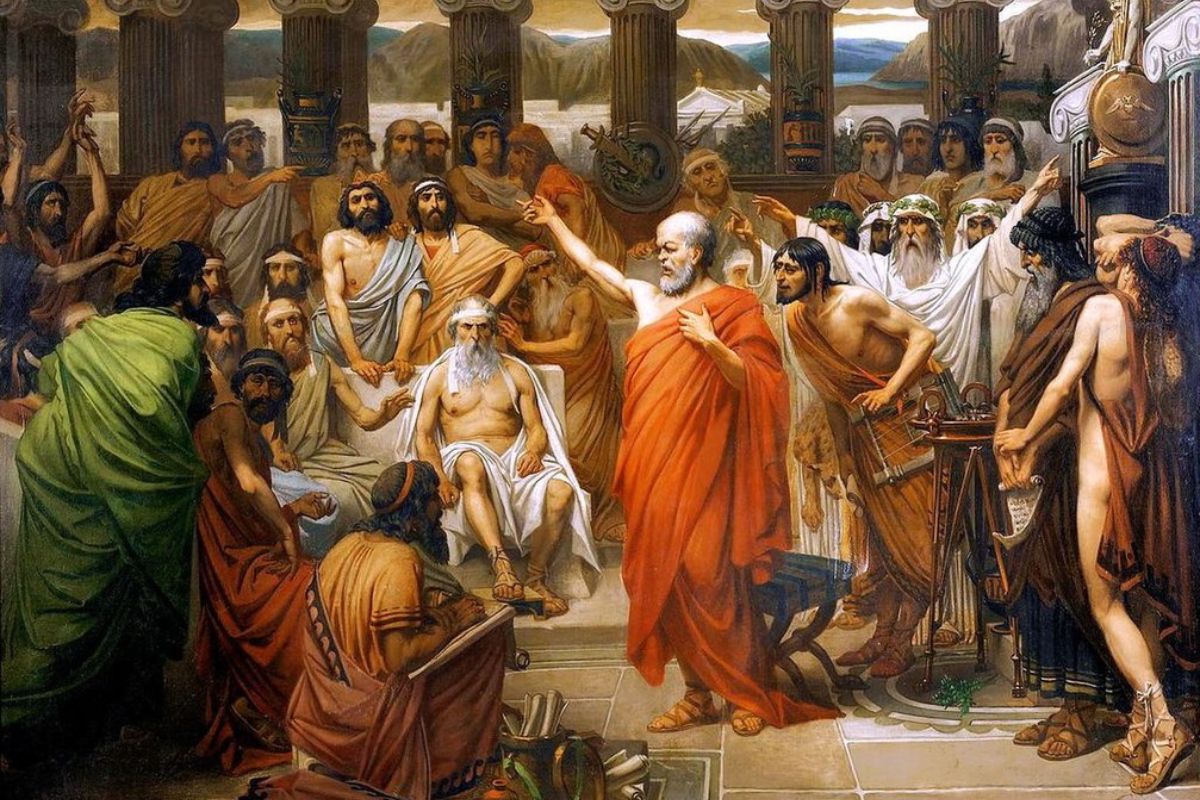Socrates (469-399 BC) was a classical Greek philosopher and one of the founders of Western philosophy. He wrote nothing himself; our understanding of him comes from his students, primarily Plato and Xenophon.
Socrates spent his life engaging in philosophical discussions and is famous for the Socratic method, which involves asking probing questions to stimulate critical thinking.
Accused of impiety and corrupting the youth, he was sentenced to death by the Athenian court and died by consuming poison hemlock. His life and death had a profound influence on Western thought.
| Year | Event |
|---|---|
| 469 BC | Socrates is born in Alopeke, a deme of Athens, Greece. |
| Mid-5th century BC | Socrates begins to develop his philosophic thought and works as a stonemason. |
| 431-404 BC | The Peloponnesian War takes place. Socrates serves as an infantryman in several campaigns, distinguished for his courage. |
| Circa 407 BC | Plato becomes a student of Socrates. |
| 403 BC | Socrates is accused by the Thirty Tyrants of impiety and corruption of the youth, but he is not brought to trial. |
| 399 BC | Socrates is brought to trial on charges of “impiety” and “corrupting the youth”, he is found guilty and sentenced to death. |
| 399 BC | Socrates is executed by hemlock poisoning in Athens. |
Timeline of Socrates
469 BC – Socrates is born in Alopeke, a deme of Athens, Greece
Socrates was born into a fairly typical Athenian family. His father, Sophroniscus, was a stonemason, and his mother, Phaenarete, was a midwife. His family wasn’t wealthy, but they weren’t poor either.
The name Socrates means “saved” or “salvation,” a common name at that time. Not much is known about his early life and education, but it is likely that he followed his father’s craft in his youth, learning the stonemason trade.

Mid-5th century BC – Socrates begins to develop his philosophic thought and works as a stonemason
Socrates was known to be working as a stonemason during this period, following his father’s footsteps. It was around this time he began engaging in philosophical discourse and questioning conventional wisdom, a practice that was not common at the time.
He was known for his unique approach to philosophy, now known as the Socratic method, which involved asking probing, sometimes uncomfortable questions in order to stimulate critical thinking and illuminate ideas.
431-404 BC – The Peloponnesian War takes place. Socrates serves as an infantryman in several campaigns
The Peloponnesian War was a protracted conflict between the city-state of Athens and the Peloponnesian League, led by Sparta. Socrates served as a hoplite (heavy infantryman) in many of the campaigns.
Despite the brutal and chaotic nature of this war, Socrates was noted for his bravery and resilience.
His military service brought him some acclaim, but it also exposed him to the cruelties and irrationalities of war, which would shape his philosophical views about morality, justice, and the nature of human society.
Circa 407 BC – Plato becomes a student of Socrates
Around 407 BC, a young man named Plato, who was from one of the wealthiest and most politically active families in Athens, became a student of Socrates.
Plato was deeply influenced by Socrates’ teachings and his unique way of thinking. Much of what we know about Socrates today comes from Plato’s dialogues, which often feature Socrates as a main character who questions others about their knowledge and beliefs.
However, it’s important to note that we can’t be entirely certain about which ideas were Socrates’ and which were Plato’s, as the latter may have used his teacher as a character to express his own philosophical ideas.

403 BC – Socrates is accused by the Thirty Tyrants of impiety and corruption of the youth
After the end of the Peloponnesian War, a group known as the Thirty Tyrants seized power in Athens. During their short reign, they were known for their brutal tactics, including purges of their political opponents.
Socrates was accused by the Thirty Tyrants of impiety and corruption of the youth, most likely due to his influence on young Athenians and his criticisms of traditional beliefs.
However, for unknown reasons, they didn’t bring him to trial. Some suggest that the tyrants feared Socrates due to his reputation as a thinker and a mentor to many influential Athenians. Others think that the accusations were primarily a means of intimidation.
Regardless, the charges foreshadowed the accusations that would ultimately lead to Socrates’ trial and execution.
399 BC – Socrates is brought to trial on charges of “impiety” and “corrupting the youth”
In 399 BC, three Athenian citizens brought charges against Socrates. The charges were: not recognizing the gods that the city recognized, introducing new deities, and corrupting the youth of Athens.
The trial took place in the People’s Court in Athens, made up of 501 jurors selected by lot. During the trial, Socrates defended himself, famously saying that “an unexamined life is not worth living.”
However, his defense did not convince the jury. They found him guilty, with 280 jurors voting for the death penalty.
399 BC Socrates is executed by hemlock poisoning in Athens
After the trial, Socrates was sentenced to die by drinking a cup of poison hemlock. He was given the opportunity to suggest his own punishment and could probably have avoided death by agreeing to silence or exile, but he did not choose these options.
Instead, Socrates willingly accepted the court’s verdict. He spent his final days in a prison in Athens.
His last moments, as described by Plato in the “Phaedo,” were spent in the company of his friends, discussing philosophy. He died in 399 BC, after drinking the hemlock, as per his sentence. His calm acceptance of death and his unwavering commitment to his principles until the very end have made him a figure of enduring interest and admiration in the centuries since.
